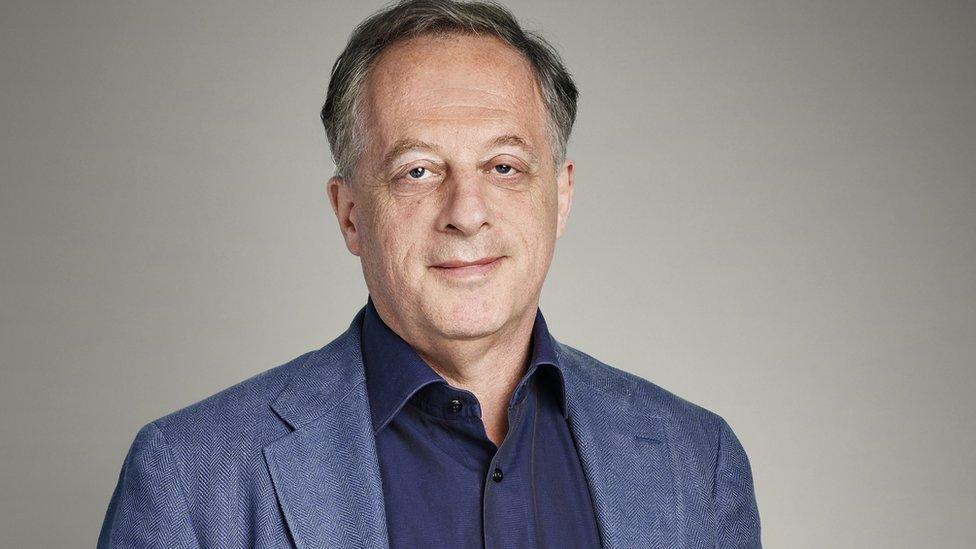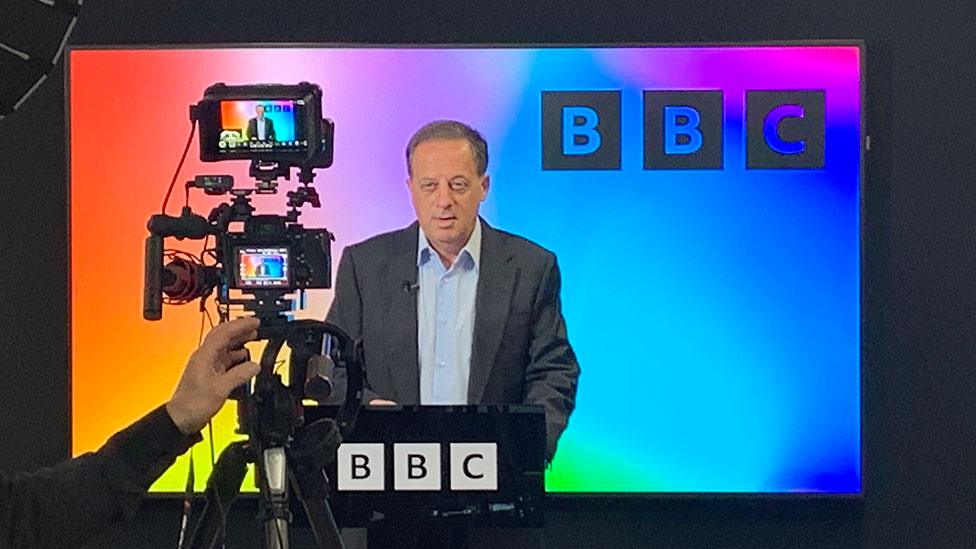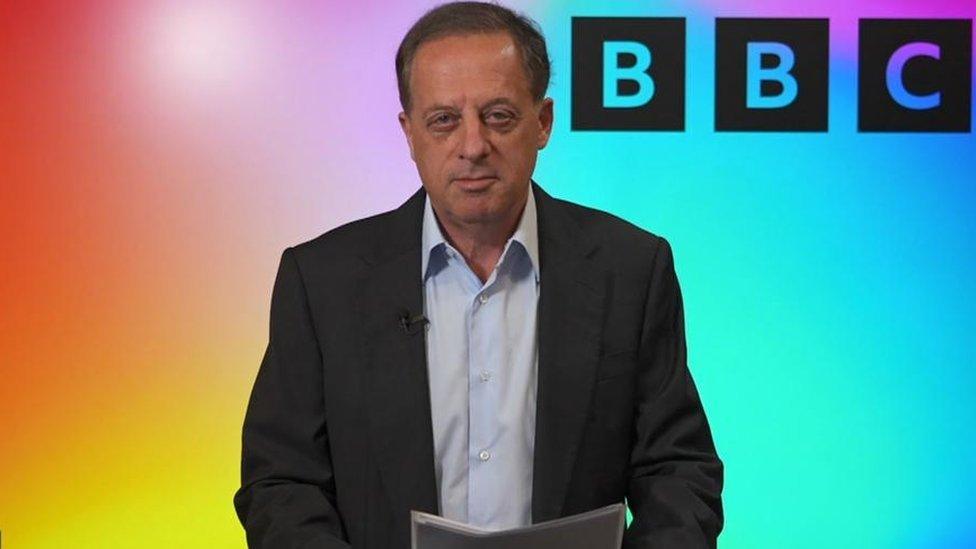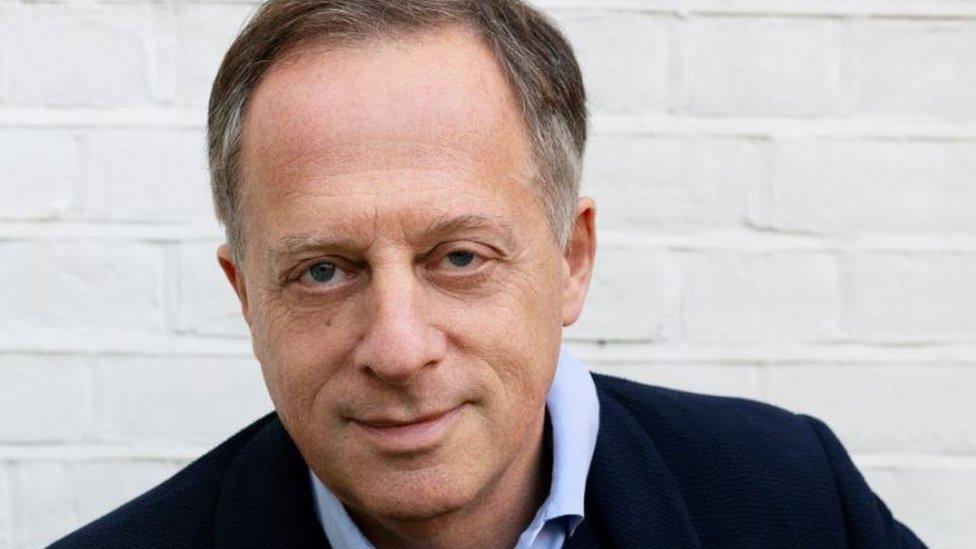Richard Sharp: BBC had no concerns about integrity, review finds
- Published

The BBC had "no concerns" about Richard Sharp's integrity when he was chairman, a review by the corporation has found.
Mr Sharp announced his resignation as BBC chairman last month, after failing to disclose dealings with Boris Johnson ahead of his appointment.
He will stand down from his position at the end of June.
A previous report found Mr Sharp "failed to disclose potential perceived conflicts of interest" in relation to the former prime minister.
His position was scrutinised after it emerged he tried to secure a high-level government meeting for a businessman offering Mr Johnson financial help.
Mr Sharp defended his conduct but stood down saying he did not want to be a distraction.
The latest review was carried out by three non-executive members of the BBC board's nominations committee - Sir Nick Serota, Shirley Garrod and Dame Elan Closs Stephens.
They were asked to look into Mr Sharp's personal and financial interests since his appointment to the role of BBC chairman in February 2021.

Richard Sharp made his resignation statement ahead of the publication of Adam Heppinstall's report in April
In a statement, the BBC said: "In conclusion, the committee confirmed it had no concerns in respect of the chairman's integrity while in the role.
"It was noted - in line with the findings of the Office of the Commissioner for Public Appointments - that the relevant declarations should have been made at the outset of the chairman's tenure, to avoid any potential perceived conflicts of interest. This was not in line with clause 2.4 of the BBC board's code of practice.
"The committee further agreed all other aspects of the board's code of practice had been followed satisfactorily during the chairman's time in his role."


If the Office of the Commissioner for Public Appointments had yet to report on whether Richard Sharp had broken public appointments rules, or if it had reported, but Mr Sharp had decided to stay on in his role as BBC chairman, the scrutiny of this new report would be intense.
Richard Sharp's integrity has been called into question in the media ever since the Sunday Times splash in January. He took the heat out of the story by resigning.
Now, nearly two weeks later, the BBC finds it has "no concerns in respect of the Chairman's integrity whilst in the role", although it says he did break the BBC's codes "at the outset" by not declaring his involvement in the story that eventually brought about his demise at the corporation.
The Nominations Committee met four times between February and May; I'm told their work cost the BBC nothing as it was built into their existing duties.
The minutes of those meetings offer up more details of Mr Sharp's interactions with senior government figures. He had three meetings with senior politicians, including Boris Johnson, that had not been noted in BBC records, although he told them either the director general or the BBC would have been notified. He also had three social meetings with the then prime minister, arranged at short notice. He discussed BBC business at two of them.
Mr Sharp told his three fellow board members who carried out the review that his relationship with Boris Johnson was "largely professional" with "only limited social engagement". His relationship with Rishi Sunak, having been his first employer, is "close", but he considered it professional and "had only recently met with his family socially for the first time". They had a trip to the Proms together, and Mr Sunak paid for his own ticket.
If he had not resigned, journalists would be poring over this document. Instead, it feels like a footnote.

The critical report which led to Mr Sharp's resignation last month followed months of speculation about his position and a row about BBC independence.
Led by barrister Adam Heppinstall, it found that the ex-investment banker and Conservative Party donor had failed to disclose two potential perceived conflicts of interest.
The first was a perception "he influenced the former prime minister to recommend him" for the BBC role by telling Mr Johnson he wanted to apply for the job before doing so.
The second related to Mr Sharp's offer to assist the PM in a "private financial matter" by setting up a meeting between Simon Case, the country's most senior civil servant, and billionaire businessman Sam Blyth.
In the event, the meeting never took place, the report found.
Mr Sharp did not accept the first conclusion but he apologised for the second, though described it as "inadvertent and not material".
Watch: Ros Atkins on... Richard Sharp and Boris Johnson loan row
The committee responsible for the latest report also published the minutes of the four meetings in which they discussed their review.
They reveal that:
Mr Sharp described his relationship with Mr Johnson as "a largely professional one, with only limited social contact"
He met the former PM at three "short notice" social events in 2021 and 2022 - including once at Chequers
Mr Sharp discussed BBC business at two of those meetings and assured the committee they would have been officially recorded
He is close to Rishi Sunak, having been his first employer (at Goldman Sachs), but it is a professional relationship, having only recently met his family socially
He went to the Proms with Mr Sunak, who paid for his own ticket
The chairman donates his £160,000 annual salary to charity
Related topics
- Published28 April 2023

- Published28 April 2023
